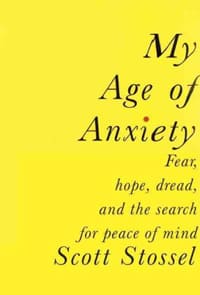May 22, 2014
By Kelly Todd

By Scott Stossel
Knopf (2013)
As editor of The Atlantic, author of multiple books and a happily married family man, some might say Scott Stossel is the picturesque portrayal of happiness in our society. His kind and gentle demeanor even earned him the nickname “human Xanax” around his friends because of the calming nature of his personality. The nickname, as Stossel points out, is almost comically ironic. With his book My Age of Anxiety: Fear, Hope, Dread, and the Search for Peace of Mind, Stossel “comes out,” as he puts it, by revealing to the world his actual experience with anxiety which he long sought to hide.
Taking on the role of an individual affected by anxiety (as opposed to the finite role of a scholar, psychologist or scientist, he says) Stossel was able to create a unique blend of genres in his book. His book combines the “history, literature, philosophy, religion, popular culture and recent scientific research” of anxiety, sewn together with his own interweaving personal narrative. The stories which he shares with his readers range from heart breaking recollections of his great-grandfather, who was committed to the famous McLean Hospital in Belmont, Mass. for acute anxiety, to some seemingly bizarre treatments Stossel has faced on his almost four decade long journey with anxiety, including a failed experience with ipecac to cure him of his phobia of vomiting and lots and lots of vodka.
Beginning at the age of 6 and continuing until present day, Stossel has found himself affected by one type of anxiety or another. He has faced panic attacks, phobias, social anxiety, performance anxiety and generalized anxiety, just to name a few. Because of his anxiety, Stossel has tried a variety of treatments including cognitive-behavioral therapy, family and group therapy, hypnosis, meditation and medication. This novel, he writes, is just another way for him to address and (hopefully) come to terms with his anxiety. He explores the history, science and research surrounding his condition in order to shed light for both himself and others on what “anxiety” truly is and what it means to be living with this condition.
Stossel’s book could function effectively as a guide to anyone affected by anxiety. His weaving narrative and scholastic descriptions lead the reader on an entertaining and educational journey through the intricacies of anxiety. In his book Stossel first addresses the enigmatic nature of anxiety as a diagnosis. Anxiety only become recognized as a diagnostic category 35 years ago. To this day, the majority of people who diagnose or experience this condition define it differently.
Stossel elaborates on the history of anxiety, looking at it from the psychological, social and biological frames of thought. He goes on to write about the effect anxiety has had on his body physically, including vignettes about his nervous stomach and an academic analysis of how anxiety changes ones brain function. His chapter on anxiolytic medication is extremely well researched and is peppered with his own trials and tribulations with medication. Towards the end of the book Stossel reflects on biology once more as he contemplates the nature versus nurture debate, the role genetics may play in anxiety and what this may mean for his children.
In the final chapter of his book, Stossel looks once more at what it means to him to experience anxiety. The conclusions he draws could resonate with anyone, whether they experience extreme anxiety or have never experienced it at all. One in five people, he writes, will experience anxiety at some point in their lifetime. With this book as your guide you can come to understand this condition that impacts so many people and one man’s journey toward reconciliation.
We’re always accepting submissions to the NAMI Blog! We feature the latest research, stories of recovery, ways to end stigma and strategies for living well with mental illness. Most importantly: We feature your voices.
LEARN MORENAMI HelpLine is available M-F, 10 a.m. – 10 p.m. ET. Call 800-950-6264,
text “helpline” to 62640, or chat online. In a crisis, call or text 988 (24/7).